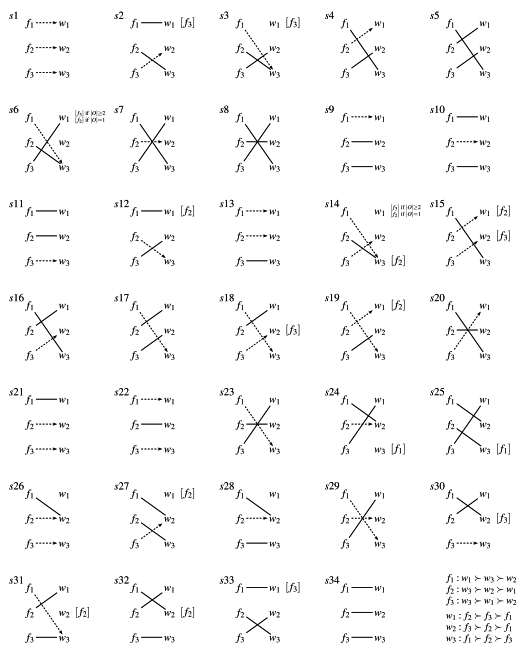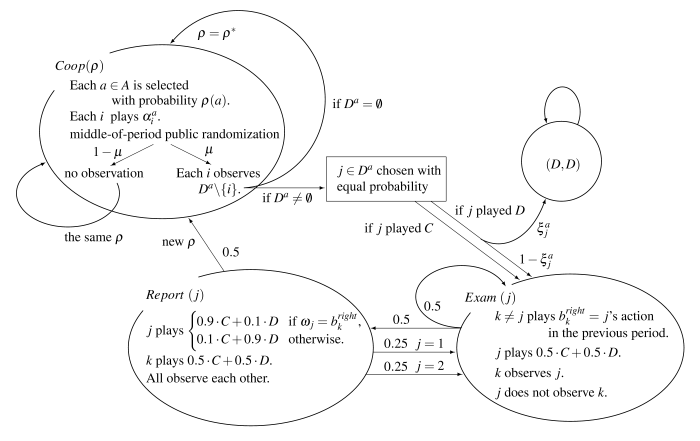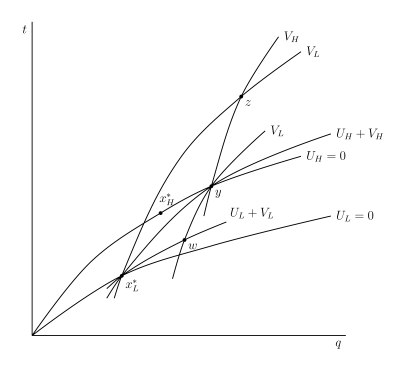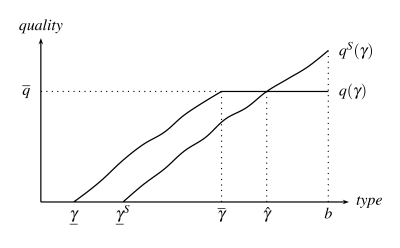
Effrosyni Diamantoudi, Eiichi Miyagawa, and Licun Xue
Gale and Shapley's matching model has a "stable matching," where no pair of a firm and a worker prefer each other. The main application has been a one-time matching with a centralized matchmaking mechanism. However, not many job markets are centralized, and participants may remain active in the market even after they are matched. This paper studies an infinite-horizon game where matching takes place every period in a decentralized fashion. Every period, firms with vacant positions make offers to workers, who then decide which offer to accept. The game depends on whether agents commit to their relationships. With no commitment, a worker can leave the current employer but may also be dismissed. With two-sided commitment, matched pairs withdraw from the market. With one-sided commitment, workers are protected from dismissal but remain active in the market, as in the case of tenured professors. We characterize stationary equilibria for each commitment structure. Without commitment, equilibrium outcomes coincide with stable matchings; neither side of the market is favored and the set of unemployed workers is equilibrium-invariant. With commitment, either one-sided or two-sided, an equilibrium may reach an unstable matching even if there is no initial commitment. With one-sided commitment, an equilibrium may even yield an unstable matching where all workers are worse off than in every stable matching. In this case, the workers are better off if job protections are removed.
Games and Economic Behavior, Volume 92 (2015), Pages 1-17.
Paper (PDF)

Eiichi Miyagawa, Yasuyuki Miyahara, and Tadashi Sekiguchi
The folk theorem literature has been relaxing the assumption on how much players know about each other's past action. Here we consider a general model where players can ``buy'' precise information. Every period, each player decides whether to pay a cost to accurately observe the actions chosen by other players in the previous period. When a player does not pay the cost, he obtains only imperfect private signals. Observational decisions are unobservable to others. Known strategies such as trigger strategies do not work since they fail to motivate players to pay for information. This paper shows that the folk theorem holds for any level of observation costs. Unlike existing folk theorems with private monitoring, ours imposes virtually no restriction on the nature of costless imperfect signals. The theorem does not use explicit or costless communication, thereby having implications on antitrust laws that rely on evidence of explicit communication. The main message is that accurate observation alone, however costly, enables efficient cooperation in general repeated games.
Journal of Economic Theory, Volume 139, Issue 1, March 2008, Pages 192-221. .
Paper (PDF)

Susanna Esteban and Eiichi Miyagawa
Unlike consumers in standard economic models, the average consumer has to deal with temptation and go through a costly process of self-control. What if firms are aware of consumers' self-control problems? Does it affect firms' optimal selling strategies qualitatively? To answer this question, we use Gul--Pesendorfer utility formulation and characterize a monopolist's optimal selling scheme in the otherwise standard model of nonlinear pricing. With costly self-control, the firm can earn more profits by offering multiple menus (or plans). If the temptation of consumers is to buy a larger quantity (or a good of higher quality), a set of menus can be designed to extract all the surplus: with those menus, consumption choices appear as if the consumers' preferences were observable. If the temptation is to choose a smaller quantity (or spend more on outside options), full surplus extraction is not possible. The optimal scheme in this case charges entry fees since they work as a commitment device for consumers.
December 18, 2006 (First public version: November 4, 2004)
Paper (PDF 379KB)

Susanna Esteban, Eiichi Miyagawa, and Matthew Shum
A basic assumption of economics is that consumers choose what they want. However, many consumers find it difficult to stop overeating, overspending, smoking, procrastinating, etc, even though they want to. In reality, consumers have temptation and it is psychologically costly to exercise self-control. To clarify the implications of the existence of temptation and self-control costs, this paper studies a firm's optimal selling strategy exploiting the behavioral features of consumers. We characterize optimal nonlinear pricing schemes for a monopoly when self-control is costly for consumers. Since consumers have a preference for commitment, the firm faces a trade-off between offering a small menu that makes the consumers' self-control easier and offering a large menu that achieves better price discrimination. We show that the optimal menu resembles the one in the standard nonlinear pricing problem with a price ceiling, where the upper bound on prices is determined endogenously by a participation constraint. The ceiling motivates the firm to offer a relatively flat and compact price schedule, serving more consumers with low demand. The characterization also shows that the firm may earn less if consumers have temptation.
Journal of Economic Theory, vol 135 (2007), no 1, pp 306-336.
Paper (PDF 261KB)

Biung-Ghi Ju, Eiichi Miyagawa, and Toyotaka Sakai
When resources are divided among agents, the characteristics of the agents are taken into consideration. A simple example is the bankruptcy problem, where the liquidation value of a bankrupt firm is divided among the creditors based on their claims. We characterize division rules under which no group of agents can increase the total amount they receive by transferring their characteristics within the group. By allowing agents' characteristics to be multi-dimensional and choosing the meaning of variables appropriately, our model can subsume a number of existing and new allocation problems, such as cost sharing, social choice with transferable utilities, income redistribution, bankruptcy with multiple types of assets, probability updating, and probability aggregation. A number of existing and new results in specific problems are obtained as corollaries.
Journal of Economic Theory, vol 132 (2007), no 1, pp 1-26.
Paper (PDF 164KB)


Susanna Esteban and Eiichi Miyagawa
Standard pricing theories consider consumers without temptation. With temptation and costly self-control, consumers dislike choice sets with tempting alternatives. We study firms' strategy against such consumers, using Gul-Pesendorfer preferences and a game where firms compete by offering menus.
Economics Letters, vol 90 (2006), no 3, pp 348-355.
Paper (PDF 126KB)
Eiichi Miyagawa, Ryo-ichi Nagahisa, and Koichi Suga
For a social code of conduct to gain universal acceptance in a society, it would have to satisfy minimum requirements of consistency and procedural justice. The so-called universalizability principle in ethics says that any moral judgement made for an action of a person in a situation should be universalizable to other persons' actions in situations that are identical in relevant respects. By adapting standard axioms in social choice theory, we formalize this principle in the framework of normal form games and study its implications on equilibrium outcomes. A social code specifies socially acceptable responses against other individuals' behavior. A fair play equilibrium is an action profile where everyone behaves optimally subject to the social code. We show that for any admissible social code, the set of fair play equilibria coincides with that of Nash equilibria in all games. The result identifies a conflict between the universalizability principle and what a social code can achieve as equilibrium outcomes.
June 7, 2005 (First public version: January 22, 2003)
Paper (PDF 283KB)

Eiichi Miyagawa, Yasuyuki Miyahara, and Tadashi Sekiguchi
This paper analyzes repeated games in which it is possible for players to observe the other players' past actions without noise but it is costly. One's observation decision itself is not observable to the other players, and this private nature of monitoring activity makes it difficult to give the players proper incentives to monitor each other. We provide a sufficient condition for a feasible payoff vector to be approximated by a sequential equilibrium when the observation costs are sufficiently small. We then show that this result generates an approximate Folk Theorem for a wide class of repeated games with observation costs. The Folk Theorem holds for a variant of prisoners' dilemma, partnership games, and any games in which the players have an ability to "burn" small amounts of their own payoffs.
January 27, 2003
Paper (PDF 255KB)
This paper studies resource-allocation mechanisms by using a reduced-form notion of mechanism. We formulate a mechanism by specifying the state space of the mechanism, the set of outcomes that agents can induce in a given state, and the set of admissible outcomes in each state. This notion of mechanism includes the Walrasian mechanism and majority voting as well as all game forms. With this notion, monotonicity is not only necessary but sufficient for a social choice correspondence to be implementable. Our main result is that in the context of exchange economies, if a mechanism implements a sub-correspondence of the Pareto correspondence and satisfies localness (one's "budget set" in a given state is independent of other agents' endowments), then the mechanism necessarily implements a sub-correspondence of the core correspondence. If the mechanism also satisfies anonymity, then it actually implements a sub-correspondence of the Walrasian equilibrium correspondence.
Discussion Paper Series #0203-09, Department of Economics, Columbia University
Revised: September 3, 2002
Paper (PDF 264KB)
Effrosyni Diamantoudi, Eiichi Miyagawa, and Licun Xue
This paper studies whether a sequence of myopic blockings leads to a stable matching in the roommate problem. We prove that if a stable matching exists and preferences are strict, then for any unstable matching, there exists a finite sequence of successive myopic blockings leading to a stable matching. This implies that, starting from any unstable matching, the process of allowing a randomly chosen blocking pair to form converges to a stable matching with probability one. This result generalizes those of Roth and Vande Vate (1990) and Chung (2000) under strict preferences.
Games and Economic Behavior 48(1): 18-28 (2004)
Paper (PDF 129KB)
Notice: Copyright and all rights therein are retained by Elsevier Science. The original publication is available in Science Direct at http://www.sciencedirect.com.
This paper proves a simple and general theorem on resource-allocation mechanisms that achieve Pareto efficiency. We say that a mechanism (game form) is normal if at any action profile, an agent who obtains his endowments neither pays nor receives a positive amount. In the context of auctions, this simply means that losers receive no bill. We prove that for any normal mechanism, if its Nash equilibrium allocations are Pareto efficient for all preference profiles, then the equilibrium allocations are necessarily in the core. The result holds for a large class of allocation problems in which monetary transfers are feasible and the consumption space is discrete except for the space of transfers. Examples include auctions with any number of objects, economies with indivisible public goods, marriage problems, and coalition formation.
Discussion Paper Series #0102-64, Department of Economics, Columbia University
June 2002
Paper (PDF 295KB)
This paper provides simple four-stage game forms that fully implement a large class of two-person bargaining solutions in subgame-perfect equilibrium. The solutions that can be implemented by our game forms are those that maximize a monotonic and quasi-concave function of utilities after normalizing each agent's utility function so that the maximum utility is 1 and the utility of the disagreement outcome is 0. This class of solutions includes the Nash, Kalai-Smorodinsky, and Relative Utilitarian solutions. The game forms have a structure of alternating offers and contain no integer device.
Published in: Games and Economic Behavior 41(2): 292-308 (2002)
Paper (PDF 256KB)
Notice: Copyright and all rights therein are retained by Elsevier Science. The original publication is available in Science Direct at http://www.sciencedirect.com.
Bettina Klaus and Eiichi Miyagawa
We consider a problem of allocating indivisible objects when agents may desire to consume more than one object and no monetary transfers are allowed. We are interested in allocation rules that satisfy desirable properties from an economic and social point of view. In addition to strategy-proofness and Pareto efficiency, we consider consistency and two solidarity properties (replacement-domination and population-monotonicity). In most of the cases, these properties are satisfied only by serially dictatorial rules.
Published in: International Journal of Game Theory 30(3): 421-435 (2002)
Paper (PDF 152K)
Notice: Copyright and all rights therein are retained by Springer-Verlag. The original publication is available in LINK at http://link.springer.de.
We study house allocation problems introduced by L. Shapley and H. Scarf (1974, J. Math. Econ. 1, 23-8). We prove that a mechanism (a social choice function) is individually rational, anonymous, strategy-proof, and nonbossy (but not necessarily Pareto efficient) if and only if it is either the core mechanism or the no-trade mechanism, where the no-trade mechanism is the one that selects the initial allocation for each profile of preferences. This result confirms the intuition that even if we are willing to accept inefficiency, there exists no interesting strategy-proof mechanism other than the core mechanism.
Published in: Games and Economics Behavior 38(2): 347-361 (2002)
Paper (PDF 191KB)
Notice: Copyright and all rights therein are retained by Elsevier Science. The original publication is available in Science Direct at http://www.sciencedirect.com.
We consider the Shapley-Scarf house allocation problem where monetary transfers are allowed. We characterize the class of mechanisms that are strategy-proof, ex post individually rational, ex post budget balanced, and "collusion-proof." In these mechanisms, the price of each object is fixed in advance, and the objects are reallocated according to the (unique) core assignment of the Shapley-Scarf economy associated with the prices. The special case in which all prices are zero is the core mechanism studied by Shapley and Scarf. Our mechanisms are compelling alternatives to the Groves mechanisms, which satisfy neither budget balance nor our condition of collusion-proofness.
Published in: Journal of Economic Theory 100(2): 329-355 (2001)
Paper (PDF 237KB)
Notice: Copyright and all rights therein are retained by Elsevier Science. The original publication is available in Science Direct at http://www.sciencedirect.com.
Hotelling (1929) studied two competing firms choosing their locations on a street. We consider instead a planner who builds two identical public facilities (e.g., libraries, parks, bridges, etc). We ask a normative question: Where should the planner build these facilities? We prove an axiomatic characterization of the efficient social choice rules that satisfy what is called the replacement-domination, which is a formulation of the idea of "solidarity" among the agents.
Published in: Social Choice and Welfare 18(3): 527-541 (2001)
Paper (PDF 125K)
Note: There is a typo in the description of the Pareto set (the 4th line of the 4th paragraph on page 531). It is required that the peaks of i and j belong to [x, y]. The rest of the paper is not affected by this typo. I thank Lars Ehlers for pointing out the typo.
Notice: Copyright and all rights therein are retained by Springer-Verlag. The original publication is available in LINK at http://link.springer.de.